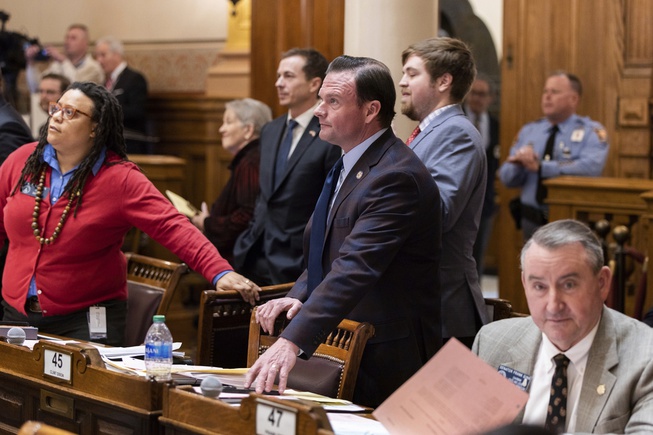
Arvin Temkar/Atlanta Journal-Constitution via AP
State Sen. Clint Dixon, center, R-Gwinnett, awaits voting results over Senate Bill 386, a sports betting bill, in the Senate at the Capitol in Atlanta, on Thursday, Feb. 1, 2024.
Thursday, Feb. 1, 2024 | 12:58 p.m.
Georgia senators passed a bill to allow sports gambling Thursday, but not before deciding that the measure also requires a state constitutional amendment, throwing ultimate passage into doubt.
The Senate voted 35-15 to pass Senate Bill 386, sending it to the House for more debate. But 34 senators went against the sponsor's wishes by attaching the requirement for the amendment in a separate vote. That would necessitate an additional constitutional amendment which would need support from at least 38 senators.
The maneuvering shows how many Georgia lawmakers support an expansion of legal gambling, but disagree on what additional gambling should be added or by what legal method. That has killed bills years after year, including in 2023.
Nationwide, 38 states allow sports betting. Some states allow only in-person bets, although most allow electronic betting from anywhere.
“This issue is frustrating because so many of us generally agree about it, but year after year, we’ve seen it get stuck," said Sen. Jason Esteves, an Atlanta Democrat.
Supporters of passing a bill without an amendment say sports betting can be authorized under the Georgia Lottery. Voters approved the lottery in a statewide referendum on a constitutional amendment in 1992. That would mean that proceeds would be legally earmarked to prekindergarten classes and HOPE Scholarships for students who achieve at least a “B” average in high school.
Sen. Clint Dixon, a Buford Republican, said more money for both programs is “much needed,” saying sports betting could generate $100 million or more in state tax revenue each year. Dixon's bill would also require the lottery to gradually spend down a substantial part of its $2 billion in reserves, which would further increase funding.
But many who voted for the bill also supported the constitutional amendment, which would allow the proceeds of sports gambling to be directed to other purposes, such as need-based scholarships.
Democrats in particular have pushed for need-based scholarships. Their backing is key because some Republicans morally oppose gambling. Democrats have withheld their votes in past years, seeking to bargain over other issues.
Others support a constitutional amendment because they argue Georgia voters never intended sports betting to be included when they passed a lottery in 1992. Sen. Bill Cowsert, an Athens Republican is a leading proponent of that stance. He called denying a statewide vote “sneaky,” and suggested that a court challenge would defeat any law that passed without an accompanying constitutional amendment.
“My counsel would be don’t go spend this million dollars and start investing in this until you know this is constitutional," Cowsert said. "There will be plenty of challenges.”
An effort to pass a constitutional amendment flopped last year when it won 30 votes, a majority of senators but short of the 38 needed.
A different Senate committee earlier this session passed a bill that would require a constitutional amendment, but there’s been no further movement on that measure. Those measures are backed by those who would like to see casinos and betting on horse racing in Georgia, as well as those would would like to spend sports betting taxes on other purposes.
The bill that passed Thursday would take 20% of proceeds in taxes, after prizes are paid to gamblers. Nationwide, tax rates are set at anywhere from 6.75% in Iowa to 51% in Rhode Island and New York.
The measure would give one license directly to the Georgia Lottery. Another eight licenses would be given to pro sports interests in Georgia, including MLB's Atlanta Braves, the NFL's Atlanta Falcons, the NBA's Atlanta Hawks, the WNBA's Atlanta Dream, Major League Soccer's Atlanta United. Other licenses would go to NASCAR's Atlanta Motor Speedway, and golf's Augusta National and PGA.
The lottery would be in charge of distributing seven other licenses without ties to pro sports teams. Those licenses would require a $100,000 application fee and an annual license fee of $1 million.
